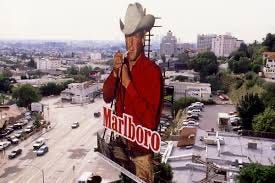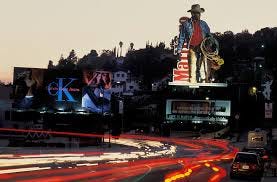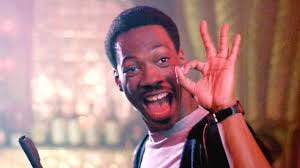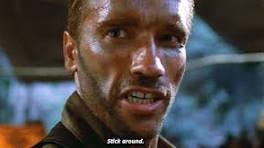25 years ago, as part of a settlement the tobacco companies made to resolve a series of lawsuits, the iconic “Marlboro Man” billboard that had stood proudly atop the iconic Sunset Strip for nearly twenty years, bathing Hollywood in his reflected macho glow, was pulled down. And a little bit of The Strip’s once-indomitable cool factor came down with it.
Looking back, it symbolized the beginning of the end of something important.
Not long ago I had lunch with a movie executive who is also a friend. He’s a Progressive, obviously, because almost everyone in Hollywood is Progressive. But there are times when Progressivism seems like a jacket Hollywood folks throw on before leaving the house in the morning… it’s there for protection, but one must always be ready to take it off if things gets a little hot… although never for very long, and never in public… certainly not any place where someone might be watching and observe your bare arms.
I suppose it must have been a little warm, politically speaking, on our friendly lunch date because after catching up on our personal lives, we began to talk about the state of the business and our conversation eventually meandered, as such conversations often do in Hollywood these days, to the subject of “packaging.”
The way that movies are sold has changed radically over the last ten years. For much of my career, studios invested in the movies they wanted to make very early on in the process, either by buying original pitches or fully-written screenplays from writers or by buying or optioning books, games or other IP and then paying writers to develop them from the ground up. Once the studio had a script it was comfortable making, they would send that script to directors and actors in hopes of packaging the movie in a way that would be pleasing to the bean counters on the studio’s “green light committee.”
Things are very different now. For one thing, the “spec script” market, where “spec” is short for “speculative”, has completely dried up. The studios are in cost-cutting mode, and so they no longer want to invest in ideas or screenplays early on the process. They only want to buy movies that are ready to go and can be made quickly. Almost no one sends scripts out to the marketplace “naked” anymore, which is to say scripts without a package of a director and/or a star already attached, because the studios have mostly gotten out of the development business and are reluctant to buy anything that requires time (and money) to develop.
And while it has never been easy to attach a big name director or star to a script or piece of IP that is not already “set up” at a studio, over the last decade getting those big names to attach has only gotten harder.
This has a lot to do with the fact that the list of “meaningful” movie star talent has gotten alarming short and painfully thin. Look around at the stars who reliably populate our movies these days… the two most bankable stars in town are Tom Cruise and Brad Pitt… still. Neither man is under the age of 60, which has traditionally been the age where movies stars begin the transition out of their leading man phase and into their elder statesman of Hollywood phase in order to give way to a younger generation of movie stars. The problem is that here in 2025, those young stars are few and far between. Just as there were not enough stars to replace Arnold, Sly, Eddie, Bruce and Mel in the 2000’s, there are distressingly few to replace Cruise and Pitt, now.
With that in mind, let’s return to my lunch conversation. During our discussion of the ever-shortening list of meaningful actor attachments, my friend said that he missed the days when movie stars were tough. I asked him what he meant and he said when you looked at guys like McQueen, Wayne, Bronson and Newman, they exuded toughness, like they got their physiques chopping wood and fighting in bars rather than by working out in gyms. Many of the male movie stars from that era, he went on to say, fought in World War II and you could see those experiences on their faces and in their mannerisms. They had a physical presence that let you know they’d seen some shit… that their experience was life experience, and not just four years spent at Juilliard.
Things seem very different now, and the Culture has to share some of the blame.
The 21st century has been full of moral panics. One of its most high-profile and destructive panics, as symbolized by the defenestration of Mr. Marlboro, has been the cultural rejection of masculinity as classically defined in favor of a new political definition… “toxic masculinity”… which redefines classic male attributes such as strength, courage, striving, the aggressive pursuit of desirable results and the instinct to protect with violence if necessary, as something corrosive and dangerous which must be banished from polite society altogether.
Here in 2025, we seem to have found ourselves living out the plot of Stallone’s “Demolition Man” in ways that should be alarming to Americans who still have their wits about them.
The disappearance of the Hollywood Tough Guy must be viewed in the context of this moral panic. It’s easy to see how a culture that has suddenly developed late-onset fear of tough guys like Arnold Schwarzenegger, Sylvester Stallone, Mel Gibson, Eddie Murphy and Bruce Willis, men who were more likely to do their talking with lead and wisecracks than smooth McKinsey Consultant-tested rhetoric, could have spent the last decade trying to replace them with men who were smaller, thinner, less physically imposing, less aggressive, and more in touch with their feelings than their bombastic 80’s and 90’s predecessors.
But as with every other moral panic, this one quickly turned into an over-correction and the baby was unceremoniously tossed out into the alley along with the bathwater under the assumption that in the golden age of Hollywood action movies, there was only one way to be a “Tough Guy”, and that that way was, and is, toxic.
Except that’s not true at all. Men are more complex than those driving this current panic want to admit. We think of the big five, Arnold, Sly, Bruce, Eddie and Mel as a Tough Guy monolith, but each man had his own clear lane. If you needed a physically impossible juggernaut to deal with a wildly inhuman threat while having fun doing so and punctuating each kill with a snappy one-liner, you called Arnold. Sly had some overlap with Arnold, but he was more likely to play the brooding loner who fights out of necessity rather than for the pure love of the game (think “The Specialist”, “Cobra”, “Assassins” and “Cliffhanger”). If you needed a blue collar everyman who finds himself in an unexpected situation and must rise to the occasion without ever missing a cigarette break, you called Bruce. If you were looking for a drop dead funny comedian who disarmed his adversaries with jokes and for whom violence was a distasteful last resort, you called Eddie. And if you needed a broken man, half-crazy and likely suicidal, but lovable enough that every woman in America wanted to “fix” him, you called Mel.
Over the last decade, all five of these classic tough guy archetypes have largely disappeared, mostly because Hollywood has not found a way to create new stars to replace the men who made these archetypes famous, but also because Hollywood cannot seem to find a new culturally acceptable version which resonates with the audiences who crave movies featuring Tough Guys.
But things have felt different in 2025. Unlike the last few years where most Hollywood blockbusters “underperformed”, this year we are hearing more stories about how movies “surprised” at the box office, overshot their predictions, and became unexpected runaway hits.
And many of these successful 2025 movies became blockbusters largely on the back of classic movie Tough Guys… Tom Cruise as Ethan Hunt and Brad Pitt as Sonny Hayes of course, but also Jason Momoa as muscle-bound Tough Guy Garret Garrison, a fading hero trying desperately to recapture his lost mojo in “Minecraft.” In “Sinners”, Michael B Jordan plays a pair of twin brothers who are two of the toughest guys you’ll see on film this year. Wildly charismatic and sexy, they know their way around guns and aren't afraid to use gaudy violence to solve a problem. Jon Bernthal is quietly building a solid career as the guy you hire when you need someone to come in, shoot a bunch of people, smoke some cigarettes and say something cool. And now we have the trailer for Edgar Wright’s remake of the 80’s Schwarzenegger classic “The Running Man”, a reboot which features Glen Powell, a veteran of “Top Gun: Maverick” and the surprisingly Red State-friendly “Twisters”… and a man who is my personal pick for “dude most likely to emerge as the next great Hollywood Tough Guy movie star.”
Things may be looking up… not only for audiences, but for those of us for whose careers are dependent upon packaging movies with stars.
The Marlboro Man may reside only in our L.A. memories now, but if we can somehow bring the Tough Guy roaring back to Hollywood, I like to think he’d give us a proud tip of his cap… wherever he may be.
If you enjoyed this essay and would like to support the work we do here at The Continental Congress, please consider becoming a paid subscriber or buy me a coffee. Thank you, so much, for your time and your patronage!











I agree with you about Glenn Powell. Look at all the films he's appeared in and the different types of roles he played. He's a very versatile actor. Besides all his big films I also saw him in the film Devotion and I thought he was excellent. Too bad it came out at the time Jonathan Majors career imploded.
Bernthal's Punisher was almost a tough guy manifesto, and I'm glad to see him lean in. He's showing up in time to spell off Jason Statham, who is getting surprisingly creaky.